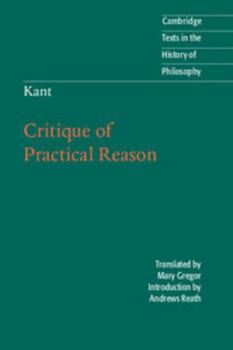Kant: Critique of Practical Reason
Select Format
Select Condition 
Book Overview
A new edition of Immanuel Kant 's Critique of Practical Reason. Originally published in 1788, the Critique of Practical Reason ( Kritik der praktischen Vernunft ) is the second of Immanuel Kant's... This description may be from another edition of this product.
Format:Paperback
Language:English
ISBN:0521599628
ISBN13:9780521599627
Release Date:November 1997
Publisher:Cambridge University Press
Length:181 Pages
Weight:0.66 lbs.
Dimensions:0.5" x 5.9" x 8.9"
Customer Reviews
4 ratings
Continuing exploration
Published by Thriftbooks.com User , 18 years ago
As long as you are searching for this book, you are interested in western moral philosophy. I still have to find someone who would take one of Kant's volumes out of his own accord and gaze at that person with wonder and amazement. But, if you are starting with Kant you are making the mistake. For understanding of Kantinan revolution you have to know at least fundaments of other moral philosophies, especially those of Plato and Aristotle. Again, I cannot offer any kind of rating about this particular translation, if you can read German I sincerely recommend reading this work on it. Kantian question of method, which he discusses in the third and closing part of this book is maybe one of the most challenging adventures in moral philosophy. Philosophers before Kant stated what is good and than proposed how to achieve that state, whatever it was. Kantian method is quite contrary and Kant himself pinpoints on this. First, there is a method, and by following that method we will be/act good. There is much too little space here to elaborate all of Kantian concepts and there are much to discuss. Including existence of free will in world of causalities, hypothetical and categorical imperatives and such. Don't be driven back by sometimes harsh language that Kant uses. Under there lies one of the greatest thoughts of western civilisation.
prussian genius creates wonderful but confusing book
Published by Thriftbooks.com User , 20 years ago
althought i have not read this translation of the work i do have a translation of critique of practical reason translated by lewis white beck and i love the book. It is like kant brilliant and a work of great genius. I have found it best to read kant methodically because of his extremely confusing word choices and meanings; with a dictionary, and a glossary (or kant dictionary whichever suits u)in hand to fully understand his rich meanings. This book is illuminating and insightfull but it may be hard to understand for u with the philosophical jargon and complex concepts. I would definitely recommend not start with kant. U may want to read his first critique the critique of pure reason first btw
christian apologetics? did you actually read the book?
Published by Thriftbooks.com User , 20 years ago
It's a classic of western philosophy as was just about everything Kant wrote, but that's not my purpose in writing this. I want to refute the silly notion that this is "nothing but Christian apologetics." Merely believing in a higher being does not make one a Christian. Aristotle, Plato, Spinoza, Hegel, and yes Kant all believed in a higher power of some sort (as do Jews, Muslims, Hindus, and many sects of Buddhists) but none of them were Christians. To be a Christian, if the word is to have any meaning at all, requires some beliefs about Jesus, in particular that he was the son of God. Kant discounts every miracle associated with Jesus, and not only that but anyone who knows the first thing about his system as a whole realizes that he would hold that the very idea of God having a human son to be utterly absurd (though Kant left us to draw this conclusion as stating these sorts of things too explicitly in 18th century Prussia was a good way to end up in jail or at least out of work). Given all that, in what sense could Kant possibly be a Christian? Now Kant does believe that Christianity expresses some ethical truths and that Jesus as portrayed in the bible was a good human being, but then again Bertrand Russell says the same things in "Why I'm Not a Christian," which in case anyone was wondering is not usually considered to be a work of Christian apologetics. Kant does claim that morality impels us to have faith that there is a God, but he steadfastly holds that we cannot anthropomorphize this being in any way (i.e. there can be no angry God nor happy God because these are the emotions of beings like us and make no sense when applied to God). This is almost impossible to reconcile with any view that could meaningfully be called Christian. Anyone interested in Kant's views on religion should check out Wood's essay on this topic in "The Cambridge Companion to Kant" and Susan Neiman also has some interesting things to say about the role of religion in Kant's philosophy in her "Evil in Modern Thought."
An outstanding book
Published by Thriftbooks.com User , 24 years ago
It has been more than 200 years since this book was firstpublish (1788) and it remains actual, so this shows the uniqueness ofKant's work. There is no doubt that the philosopher born in Koenigsberg in 1724 is among of the greatest thinkers of all time. In "Critical of Practical Reason", Immanuel Kant continues his explorations in the procedures of knowledge, understanding and experience started at 'Critical of Pure Reason."... When you read this book it becomes clear why such a philosopher was so important in the development of the science in the 19th and 20th century where the discussion about analysis, synthesis and causality remains open END





